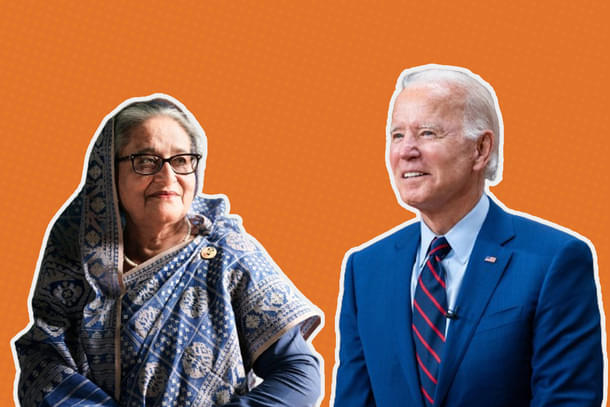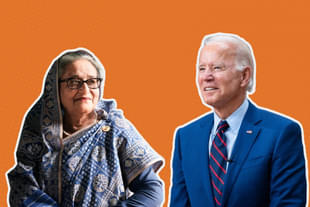Foreign Affairs
US Heeds India's View On Bangladesh, Extends Olive Branch To Sheikh Hasina After Dalliance With Opposition BNP
Jaideep Mazumdar
Feb 06, 2024, 12:52 PM | Updated 03:07 PM IST
Save & read from anywhere!
Bookmark stories for easy access on any device or the Swarajya app.


A little less than a month ago, the United States strongly criticised the just-concluded parliamentary elections in Bangladesh that brought Sheikh Hasina back to power for the fourth consecutive term by terming them “not free or fair.”
Last weekend, US President Joe Biden wrote to Sheikh Hasina expressing willingness to not only help Bangladesh achieve its “economic goals,” but also cooperate on “regional and global security” and partner with the country on a “shared vision” of “free and open Indo-Pacific.”
This stark change in the US position on Bangladesh and the country’s premier came about after repeated urgings and requests by New Delhi to Washington to reconsider its stance towards the South Asian nation.
President Biden’s refusal to congratulate Sheikh Hasina on her victory, despite greetings pouring in from India, China, Russia and many other countries, rankled Dhaka.
It is learnt that the Bangladesh leadership was so annoyed with the US that Prime Minister Sheikh Hasina refused to meet the US envoy to her country, Peter Haas.
Haas had, anyway, courted controversy and earned Dhaka’s wrath for throwing his weight around and trying to interfere in the country’s poll process.
The top US diplomat, and his counterparts from Europe, were conspicuous by their absence from the lineup of envoys who called on Sheikh Hasina after her poll victory.
The Indian High Commissioner, Pranay Verma, was the first to call on Hasina on 8 January, the day after the election results were declared, followed by the envoys from China, Russia and some other countries.
The US also planned to carry out discreet enquiries to identify Bangladesh government officials and politicians who, according to the US, undermined the election process. These individuals and even organisations, the US had declared last year, would be denied US visas.
There were reports that the US was also contemplating trade sanctions against Bangladesh’s readymade garments sector that is a major foreign exchange earner for the country.
Washington was reportedly mulling the sanctions for alleged violation of labour norms (low wages and poor working conditions) by owners of garments factories. The proposed sanctions would have hurt Bangladesh very badly and worsened the economic crisis looming large over the country.
An angry Dhaka started contemplating moves that would take the country close to China. Beijing had already assured Dhaka of its full backing to ward off pressure from the US and Western nations.
Meanwhile, China’s Envoy to Dhaka, Yao Wen, went on the overdrive and held highly-publicised meetings with key ministers in the newly-formed government.
Within a span of less than five weeks, Wen met eight senior ministers: Planning Minister Abdus Salam, Informational and Broadcasting Minister Mohammad Ali Arafat, Foreign Minister Hassan Mahmud, Finance Minister Abul Hassan Mahmood Ali, Road Transport Minister Obaidul Qader, IT Minister Zunaid Ahmed Palak, Home Minister Asaduzzaman Khan and Commerce Minister Ahsanul Islam.
Wen also held a long meeting with Salman F Rahman, a close aide of Sheikh Hasina who holds the official position of ‘private investment and industry advisor’ to the Prime Minister.
Rahman’s family owns Beximco, one of Asia’s largest textile firms that has very close links with China. Rahman wields a lot of power in Bangladesh and is believed to be Beijing’s pointsman in the government.
Dhaka was also very quick to accept an invitation from Beijing to Prime Minister Hasina to visit China. The invitation was handed over by ambassador Yao Wen when he met Bangladesh Foreign Minister Hassan Mahmud on 28 January.
Consultations have already started between the two sides to fix mutually convenient dates for the visit. This, say foreign policy experts, is quite unusual.
All these developments pointed to Dhaka’s growing closeness to Beijing and the resolve of the new government in Bangladesh to forge very close ties with China.
And that became a cause for great concern in New Delhi. India shared these concerns very promptly with top officials and diplomats of the US at various levels.
It is learnt that External Affairs Minister (EAM) S Jaishankar spoke to his US counterpart, Antony Blinken, about Bangladesh’s discernible tilt towards China and impressed upon him the need to make meaningful gestures to keep Dhaka happy.
Indian foreign ministry officials told their counterparts in the US State Department, that harsh measures against Bangladesh would push Dhaka into Beijing’s arms. And that would be a setback to the US strategy in the Indo-Pacific.
Washington was told that its ‘democracy project,’ viewed as supercilious and even hypocritical by many countries, will hinder and severely impact US strategic interests and would also undermine India’s efforts to contain China in South Asia.
A senior officer in the Ministry of External Affairs told Swarajya that India’s concerns on this issue were voiced “at the highest levels”.
US State Department officials were told that Washington’s pursuit of the policy of punishing Bangladesh for violation of ‘democratic norms and human rights’ would allow China and (to a lesser extent) Russia to woo and win over Bangladesh.
Thankfully, practical sense prevailed in Washington and President Biden’s letter reached Prime Minister Sheikh Hasina’s desk Sunday (4 February).
And in a bid to publicly demonstrate its change of stance towards Bangladesh, the US embassy in Dhaka also made the contents of the letter public.
Dhaka reacted positively, with foreign minister Hasan Mahmud telling the media: “We warmly congratulate this letter. With this letter, our relationship with the US will improve and reach a new level”.
Mahmud, who will start his four-day visit to India Tuesday (6 February), reportedly voiced his country’s disappointment with the US during his meeting with India’s EAM S Jaishankar at a bilateral meeting on the sidelines of the NAM summit at Kampala 20 January.
Jaishankar is learnt to have assured Mahmud that Bangladesh’s sentiments and concerns will be conveyed to the US. Mahmud was also assured of India’s help in getting the US off Dhaka’s back and ease US pressure on Bangladesh.




